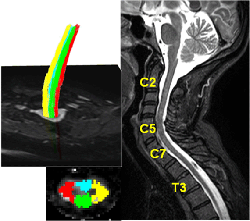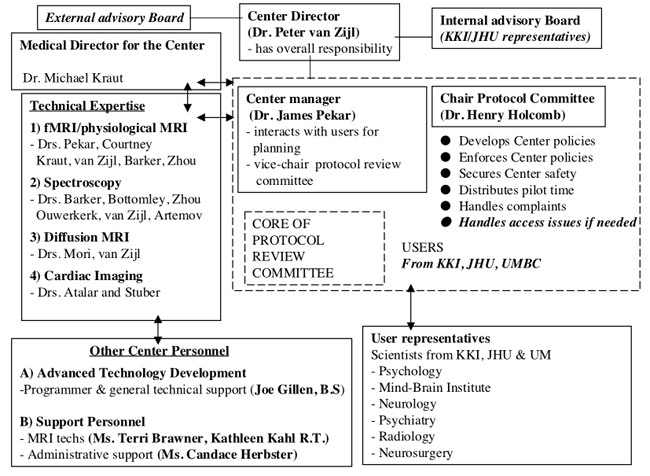Our expert faculty, support staff, and advisory network ensure high quality studies in our many research areas. Utilizing these resources, the F. M. Kirby Research Center (FMKRC) establishes a standard for the "best practices" in the fields of data acquisition and analysis for a variety of MRI technologies, including functional MRI, diffusion tensor MRI, MR spectroscopic imaging, and computational anatomy. Kirby Center personnel will work with each investigator to create, define, and refine the customized data acquisition methods needed for a specific project.
The Advisory Network consists of three committees:
- The Internal Advisory Board, consisting of members from the Kennedy Krieger Institute and Johns Hopkins University, reviews the policies and science relevant to ongoing and planned activities.
- The Protocol Review Committee advises the Internal Advisory Board on matters relating to the operation of the FMKRC.
- The External Advisory Board advises the FMKRC on organization, program, and research activities.
Our faculty assist affiliated researchers, while training graduate students and post-doctoral fellows. We also rely on our support staff to maintain the high quality of our imaging capabilities. The FMKRC also provides training on all equipment and imaging procedures, as well as instruction in the form of special events, which include group training sessions, educational seminars, and other organized scientific events.
Diffusion tensor imaging of the spinal cord.

Overall Organization of the Kirby Center
Our expert faculty, support staff, and advisory network ensure high quality studies in our many research areas. Utilizing these resources, the F. M. Kirby Research Center (FMKRC) establishes a standard for the "best practices" in the fields of data acquisition and analysis for a variety of MRI technologies, including functional MRI, diffusion tensor MRI, MR spectroscopic imaging, and computational anatomy. These methods are then disseminated to FMKRC users via formal and informal collaboration or consultation. The methods can frequently be used upon development, but may also serve as a starting point for data acquisition customized for a specific project. For example, an investigator may require high spatial or temporal resolution, or longer scans in order to increase the scan's signal-to-noise ratio via data averaging. In this case, Kirby Center personnel will work with the investigator to create, define, and refine the customized data acquisition methods needed for a specific project.

Overall organization of the F. M. Kirby Research Center and associated committees.
Advisory Network
Below are details on the three committees that comprise the Advisory Network:
- The Internal Advisory Board is an inter-institutional Advisory Committee consisting of members from the Kennedy Krieger Institute and the affiliated Johns Hopkins University. This board reviews the policies and science relevant to ongoing and planned activities. They also govern over the policies formulated within associated subcommittees.
- The Protocol Review Committee advises the Internal Advisory Board on matters relating to the operation of the Kirby Center. THe major duties of the PRC include the formulation of an equitable working policy that governs the access, safety, maintenance, and management of the shared instrumentation facility. This Committee also establishes a scientific review of all proposals that utilize the Kirby Center's resources. The members of the PRC have experience and expertise in all areas of functional imaging, including paradigm design, MR imaging, spectroscopy, and EEG methodology.
- The External Advisory Board advises the FMKRC on overall organization, the research program, and the activities related to service, training, and dissemination of information.
